BLOG ARTICLE
How To Start a Business Podcast - With Rob Walling, The Startups For the Rest of Us
Last updated: 2/26/2026
Last updated: 2/26/2026
In a recent episode of Lessons From a Podcaster by Podsqueeze, we spoke with Rob Walling, the host of 'Startups For the Rest of Us,' a prominent podcast in the entrepreneurship niche. We explored the origins of the project and the secrets behind its success.
These are the main lessons on how to start a business podcast shared by Rob himself...
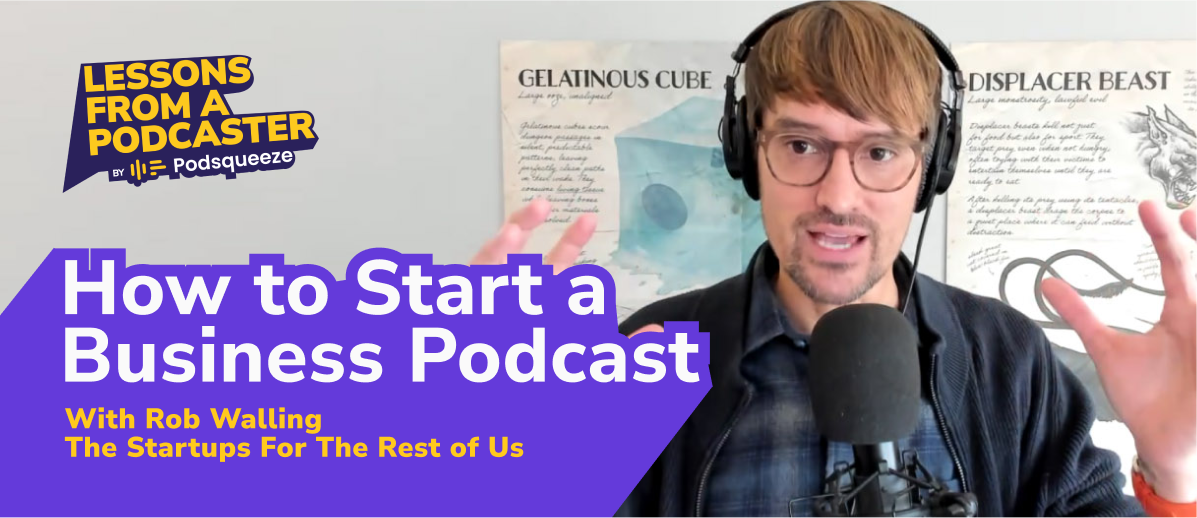
Rob Walling is an entrepreneur and startup wiz who has leveraged podcasting and social media to build impressive listenership. He has helped many bootstrapped startup founders and made multiple exits himself by buying and selling some startups.
And his results? They are staggering - he's built his podcast to 15 million downloads and up to 700 episodes published.
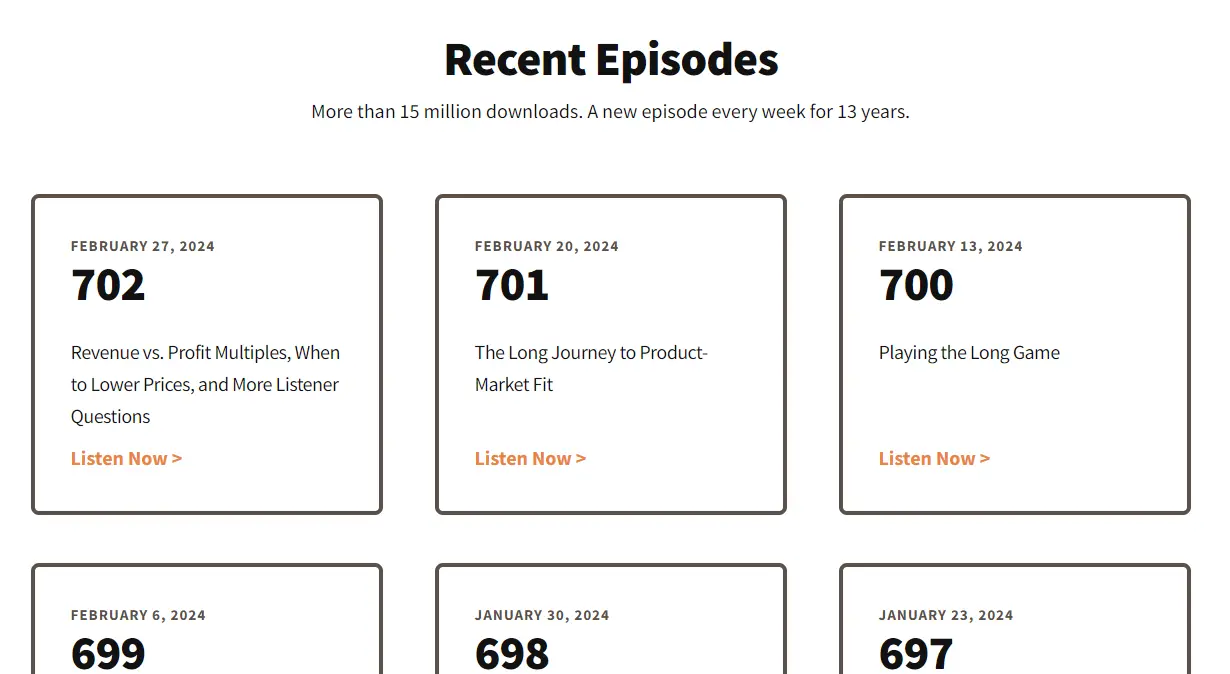
We recently sat down on an interview with Rob, the host of the “Startup for the Rest of Us” podcast, to discuss how he managed to publish his 700th episode in a very competitive niche (podcast about entrepreneurship) while having an engaged listenership.
Rob was enthusiastic to share how his passion for bootstrapped startups and founders led to the podcast success he has today. He gave insights on social media and repurposing, injecting personality into your show, unique content, and other actionable tips to grow a podcast.
If you're interested in starting your podcast or you're trying to improve your show, then keep reading.
Rob Walling's backstory
Rob didn't just start his podcast, he was first a successful blogger with about 25,000 readers.
We asked Rob to share a bit about his background and how he started with his first episode.
He shared:
I had a blog that was successful. Remember when blogs were a thing [of] RSS readers? So, I blogged pretty hard from 2005 to 2011 and in 2010, I wanted to just get a better idea of who was reading [my blog] because I had 25,000 RSS readers which was pretty good, and a couple thousand [of] email subscribers.
Rob's readers consumed his content through their RSS feeds, however they didn't know (and couldn't remember) which essays were his or were from other blog writers they were also following.
I [then] put up a survey on my blog like “What do you like best about the blog?” “What do you like least?” “What's your favorite article?” Just random questions and several of the responses were like “I'm pretty sure I like your essay but I don't know which ones are yours and which ones are others.
This realization is what led Rob to find his own voice and drove him into podcasting.
And it hit me like, I'm a commodity… that was when I realized podcasting. If I can be my voice in your ears for 30 minutes a week, I think that's the next level and so I set out to start a podcast.
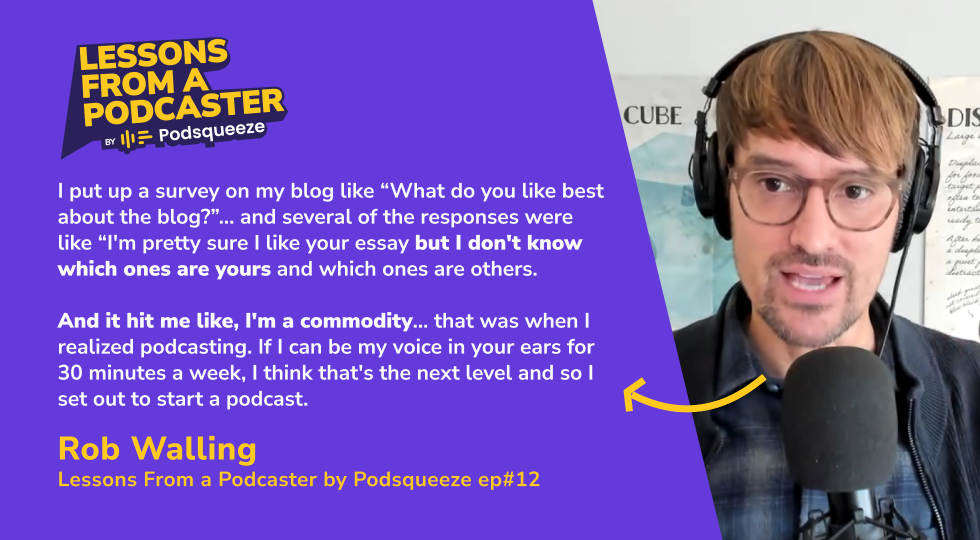
Early starts and finding a niche - a podcast about entrepreneurship
Many aspiring podcasters delay launching their podcast because they feel unprepared.
Whether it's due to emotional apprehension about facing an audience, lacking the right equipment, or not achieving the desired sound quality, the sense of "perfection" and success can seem elusive.
However, the truth is that both perfection and success evolve over time. It's through experience and interaction with the audience that one finds their footing.
So Rob started is podcast imperfectly:
I just started talking on the mic and it was awful. You can still go back and listen to it. I was so nervous with all the jitters that everyone would have when starting a podcast.”
I started in 2010. It was a thing for a couple of years that I actually thought I missed the boat a little bit which is funny now that you look back. I remember I was like “There's all these entrepreneurship podcasts already, why do you need another one?” and we were trying to define our niche; we are for bootstrappers, we're for software.
With time and consistency, Rob has transformed his podcast from an "awful" first episode to having a small production team supporting a successful podcast.
Injecting personality into your show
We were intrigued by how Rob achieved the milestones he has reached with his podcast today, and he attributed his show's success to his personality.
At first, Rob's podcast plan was to follow an interview format, inviting expert guests from his niche. However, one day, a guest canceled at the last minute, forcing Rob to improvise a solo episode. To his surprise, the audience loved it and clamored for more, leading to the solo podcast format becoming a staple.
As someone who aimed to transcend the commodity status he experienced with his blog, he stressed the significance of infusing personality into a podcast to leave a lasting impression. By sharing both triumphs and failures from your own experiences, you can forge deeper connections with your audience and imbue your podcast with a relatable personality that resonates with listeners.
If all you do is interviews and the episodes are all about your guest and not at all about you and people barely know who you are, what your opinions on things are, then you are a commodity
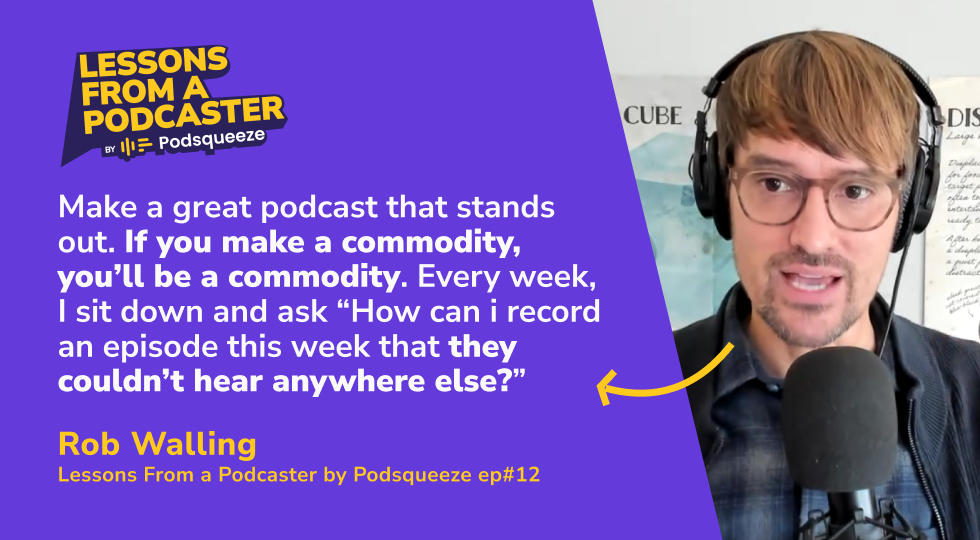
Interviews are a great way to add dynamism to your podcast as different guests bring different perspectives but it's important, as a host, to be an active contributor in the conversation also.
Rob added:
- Share your own story
- Don't ask a question and sit back. Be present in the conversation
- Let it be a conversational rather than just an interview.
Joe Rogan served as a prime example of a host who has managed to avoid being commoditized, despite employing an interview format on his podcast.
[Joe Rogan is not a commodity], watch his show, he's not sitting back, he's interjecting, he's making comments, it's a conversation rather than an interview.
Rob's production stacks to streamline his process
For Rob, having the most expensive microphone or full-stack team is not the benchmark for growing your podcast. He shared that the most important part of your podcast is the quality of your message and the right system in place.
The first seven years I used this crappy headset to record it, and you can go back and hear it. It was fine. We still had tens of thousands of listeners, you know what I mean? It didn't matter.
Here's what his production stack currently looks like;
- Rob puts all ideas on a notion workspace
- Records with Riverside
- Uses a $60 microphone - Audio Technica ATR2100X
- Has an audio engineer on the team
- Puts the recorded audio in Dropbox for easy sharing
- Has a management system in Airtable with an automated status of each episode (this excited us too).
- Podsqueeze for writing show notes
We use Podsqueeze. I actually have a quote from my assistant producer (Dan) and he said “we tried a bunch of tools for podcast AI and Podsqueeze’s show notes have been the best"
And not just this, Rob strategically uses Podsqueeze for research also.
Rob finds episodes featuring his upcoming guests and summarizes them using Podsqueeze to gain insights about each guest. By reviewing these summaries, he familiarizes himself with the guests and tailors his questions accordingly, fostering more engaging conversations and making the guests feel valued.
Additionally, designing a personal logo for your channel can help reflect your unique personality and make your brand more recognizable.
As exciting as Rob's production stacks seem, he mentioned that it's not a benchmark for your podcast success.
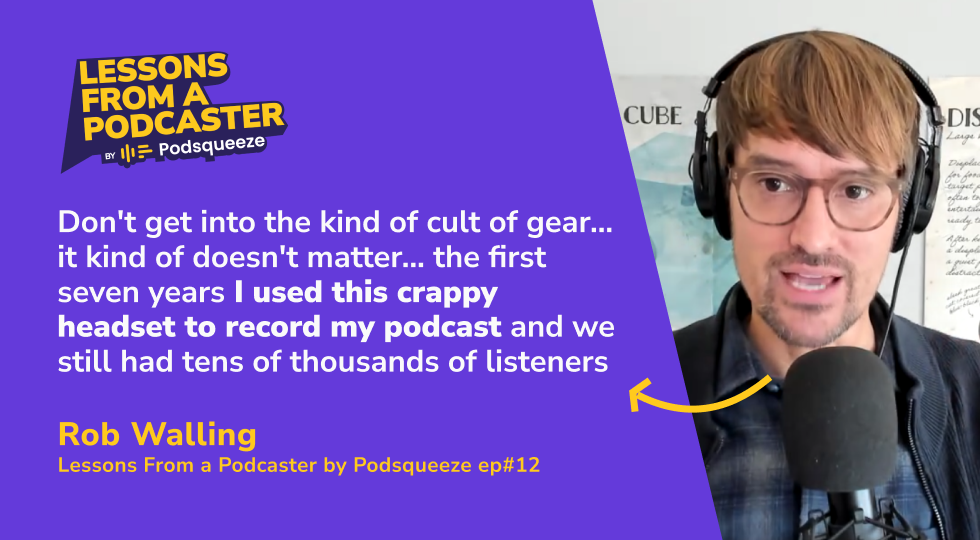
Social media and content repurposing
Social media is a great promotion ground for podcasters but many are doing it wrongly. From Rob's experience, podcasters should focus only on the platforms that have their target listeners.
For his Startup for the Rest of Us podcast, his main audiences are bootstrappers, indie hackers, and startup builders, and their social media playground is X (Twitter). On that note, he promotes his podcast on the platform.
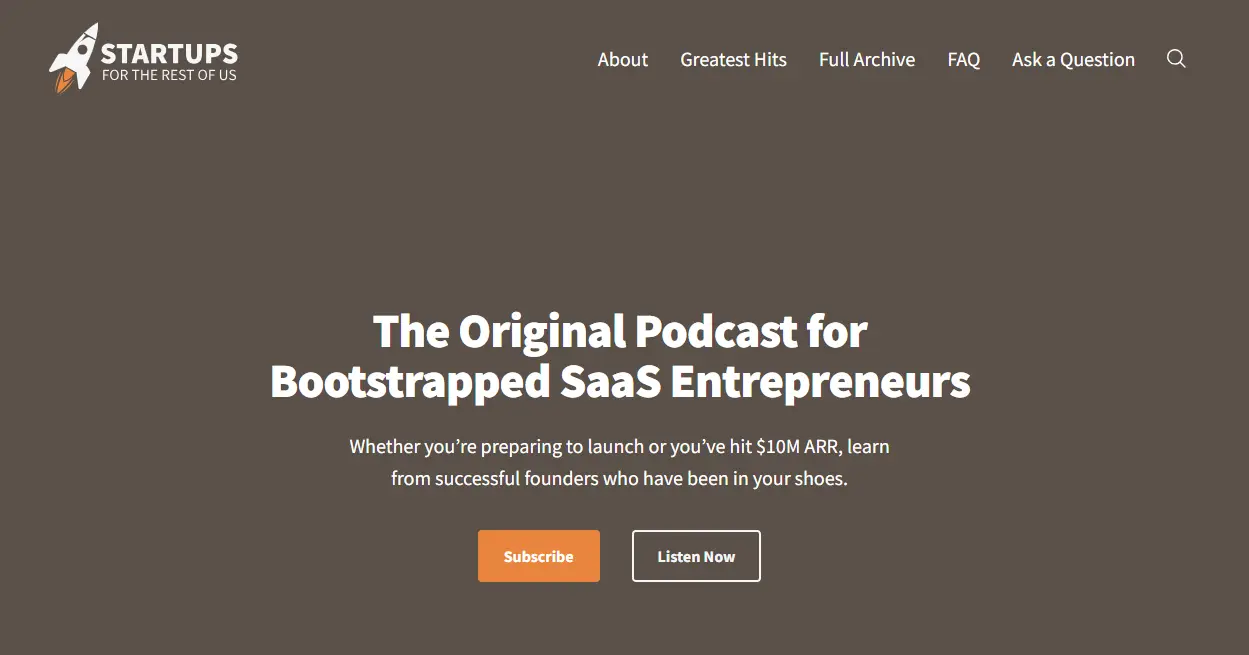
For other podcasters, if your listeners might be business-minded folks, LinkedIn might be the right platform for you. If your audiences are Gen Z, Instagram and TikTok are the right fit.
The goal here is to find the right social platform for your show, not just share your podcast clips, audiograms, or quote images everywhere. Find a platform(s) that have your target listeners and stick with it.
Growth tactics for other podcasters
We asked Rob “If you can give three (3) tips for podcasters trying to grow their podcast, what will they be?”
And this is what he had to say:
- Ship every week: Rob's consistency has led to his 700 podcast episodes and also snowballed into consistent growth every year. He mentioned that podcasters can have their own publishing schedule but it's important to be consistent with it.
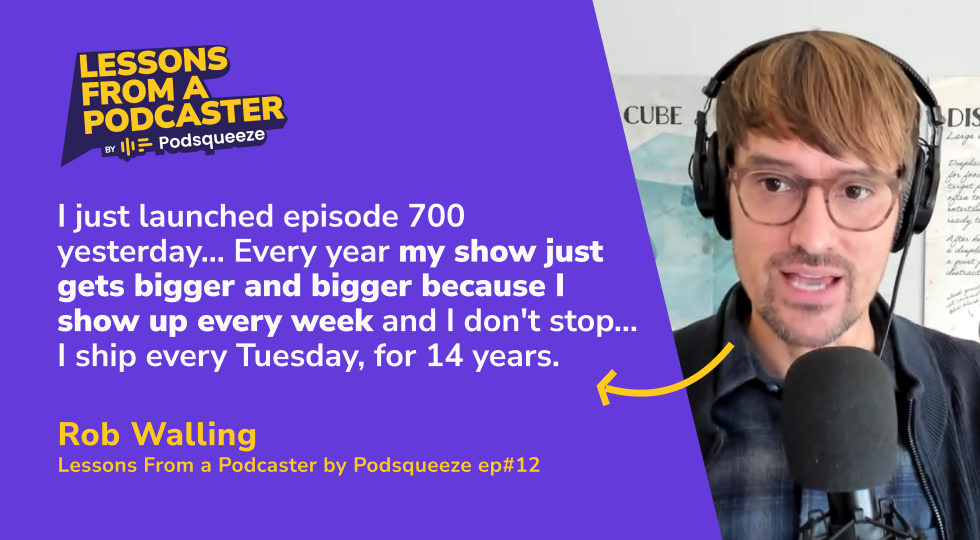
- Funnel traffic from other sources: Interestingly, Rob's second idea for podcast growth is to funnel traffic from other sources to your podcast. For him, it's his book (where he mentioned his podcast) and also his YouTube channel (with about 80k subscribers).
- Build a standout podcast: Rob's list of tips to grow a podcast isn't complete without mentioning the importance of building a standout podcast powerhouse. He shared “Make a great podcast that stands out” and this can be achieved through quality and consistent content. Conducting user (listener) research, connecting with the audience and asking for feedback is essential to tailor the content to their needs and find out what they truly value.
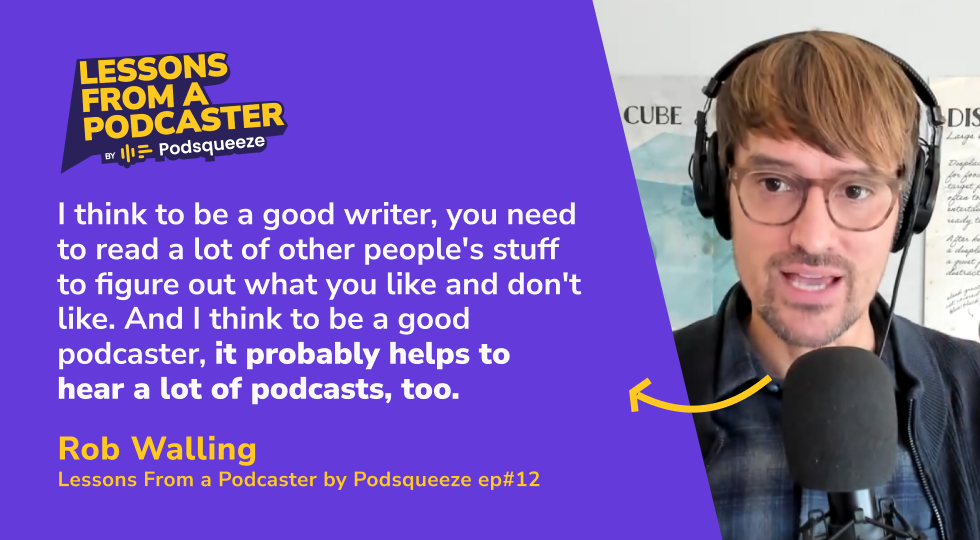
If you're interested in following along and learning more about the latest insights and tips for bootstrappers, indie hackers, and solo builders, you can listen to Startup for the Rest of Us or watch some of Rob's recent videos like “How to Build a No-Code SaaS Over $1M / Year, 6 Amateur Mistakes That TANK SaaS Success, or How To Choose a Name For Your Business, Startup, Brand, Product.
Repurpose your podcast content with AI